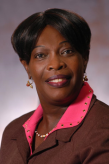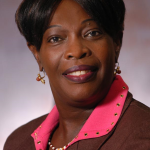[box style=’new’]As a social and community activist, Jocelyne presently sits on the Boards of Governors of La Cite Collegiale, Rideau Rockcliffe Resource Center and the Multicultural Women Empowerment Network to help promoting diversity and cultural values. Her concerns for the welfare of the community have been reflected by volunteering in various organizations and various assignments at different government and private sectors capacities. She also serves as a Champion with Outreach Recruitment Initiative for Ottawa Police Services, Ambassador for the Beyond Bridges Initiative with the RCMP and Advocacy Chair for the Youth Advisory Committee (YAC). Jocelyne’s belief in the importance of education has led to use her time as a co-trainer and a facilitator in parental conflict resolution to bring better understanding to the Child Welfare System. Jocelyne has received numerous awards including the Dr. Martin Luther King: 2008 DreamKeepers award and the Ambassador of Peace. She has also been nominated for the YMCA Women of Distinction award. With her very busy schedule, Black Ottawa Scene was unable to sit down with Jocelyne, so we sent her the questions by mail [/box]
Could you tell me about your childhood? Where were you born? Is there anything about your childhood that stands out for you? Helped form who you are today? Your parents, friends, school?
I was born in Haiti and am part of a very large family of 21. I believe that my parents’ rules helped me to be the person that I am today. Respect yourself and others, Responsibility for your acts as well as the younger sibling’s acts. I also came from the rules of the village. It takes a village to raise a child no matter where you are in this world.
When did you come to Canada, what made you decide on Canada, Ottawa?
I have been in Canada and in Ottawa in particular for 30 something years now, and my coming to Canada is not short of a miracle, that’s all I’ll say.
You have been very prominent in the black community for many years. Your influence is particularly felt within the francophone community. Could you describe your activities, especially your volunteer involvement?
I’m not sure if I have influenced the francophone community, all I know is I support the French language passionately and use every opportunity to promote the black francophone community. As a matter of fact, 25 years ago, I was one of members of a group which advocated for a francophone college because Ottawa at that time had only one college ‘the Algonquin’ and in one language, English. Guess what, for the past 3 years I sit on as the Board Governors of La Cité Collegiale, a college that most of my foster kids have been graduated from. My volunteer involvement is very wide as I tried to contribute at different capacities in various disciplines, social, community and also political.
What has been your biggest achievement and what was your biggest challenge? In your work, family life, volunteer work?
My biggest challenge was first being a single parent. Although I consider that part of my life as obtaining an MBA at the University of Life, but the stigmas, the assumptions, the constant judgement and negative comments that society attached to single families can be very hurtful and burdensome to everyday life. Children delinquency is still being associated to single household and no matter of the circumstances, I strongly believe that children are the responsibility of their parents and also of their communities. My second challenge was my fostering experience with CAS, a well defined system but a very close minded one with a 2/3 services. What they preached and what they do have no connection to the reality of these children. I’ll be more comfortable to use the word contribution instead of accomplishment because personally that word defines the world and only when human color became meaningless; kids’ hunger, violence against women and religion are eradicated from the world and only then, if I am still alive the word “accomplishment” will be part of my vocabulary.
You are very involved in the women’s movement? What made you go into this? What are the goals of this movement and how is it playing out in the national capital region?
First, I am a woman. Second, I am someone’s daughter, someone’s sister and a mother myself. I simply make it my business to keep the light on the women’s cause. The women’s movement as you say it yourself is a world concern, not just in Canada or Ottawa. When equality – equal pay for equal work values – one of recognition for equal contribution- respect is given and empowerment is felt by women also then it will be called “Social Consciousness” not “women’s movement”. Certainly Canada needs to invest more efforts in women empowerment and Ottawa still has a long way to go. That’s all I’ll say.
How do you see the relationship between black men and women in Ottawa and in Canada in general? There are some black women who claim they are not respected by black men, that black men give more respect to white women than themselves? Do you support this point of view?
We live in an open society and relationship has become part of a multi level society also. Black men, black women are all part of the mix. A recent report lifts the cloud on men’s behavior and that no color was mentioned. The recent rainbow around the world can be also benefit the comprehension of love that has no limits and no border. But the confession or experience of some black women is not just a perception. We need to consider “Culture shock” as a big contributor to the dilemma because culturally our black men are brought up to impress the other and our black women to value the other. I think it’s time to have that conversation at a round table. Even if it’s perception or reality, let’s make it a conversation because we prefer to shy away from important issues. To reverse that, let’s start learning to show more appreciation to each other, let’s value each other openly, let’s be proud of each other’s accomplishment and show support for each other’s missteps. What are we afraid of – we should allow our real side to shine amongst us not just with the other nationality. Some black men call black women “a headache”. Do you know that some white women call black men “ just body no brain”?. Well it takes a brain to suffer headache but it is an insult to be declared brainless. We really should create a space to address that dilemma.
There appears to be a divide on one level between black Francophone and Anglophone communities, and on another level between people from continental Africa and those from the Caribbean. These discrete groups operate separately and rarely hold events together or collaborate in joint projects to their mutual benefit? Do you agree with this perception and if so what can be done to increase collaboration among our various community groups?
I am glad that you mention the words perception. In my opinion until we got a common place like a Black Community Center to mingle, to educate each other, to share trust, to learn from each other, to grow and to integrate that perception will still exist. Africa is a continent not a country and slavery was the African reality not an act. This is why you see me everywhere active in and with anything black. White people see us as black not as African and Caribbean. That’s another reason that we need to create a space to learn about our history.
Looking at Ottawa’s black community, what do see as our biggest challenges? Crime, unemployment, school drop outs, other? How do we overcome them?
All of the above. We need to work together – to share responsibility and calling it ours – not yours or mine. We need to share knowledge, to develop strategies to address the problem. We should be the change. Specially us in the capital of Canada.
In the years since you’ve been in Ottawa, have you seen the situation of Blacks as changed for the better: more access to jobs, social inclusion etc.
Yes. But we still need to promote full participation. To advocate equal opportunity for proportional representation in decision making positions and the political arena.
Finally, do you have a message for readers of Black Ottawa Scene?
Let’s work collaboratively to support the Black Ottawa Scene efforts. Let’s make Ottawa part of the best practices for the advancement of the black community.


